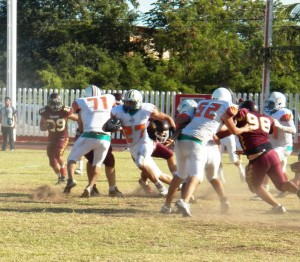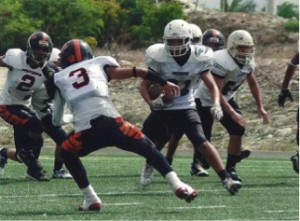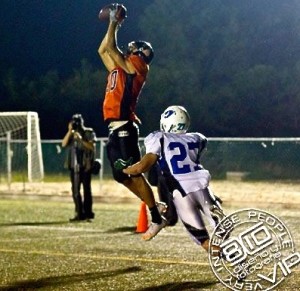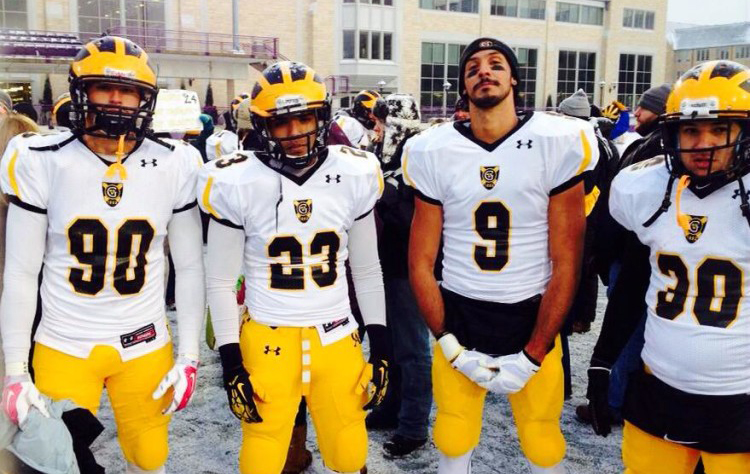In 2011, the Gustavus Adolphus football team took its first trip to Cancun, Mexico to compete against local club teams and perform service work, opening the doors for a unique athletic and academic opportunity for both Cancun natives and the Gustavus population.
Saint Peter, Minn. – As a new addition to the Gustavus Adolphus athletic community in 2009, Gustie head football coach Peter Haugen reached out to alumni in hopes of creating a wider net of service and recruitment opportunities. To do this, Haugen wanted to utilize an NCAA rule that allows its athletic teams to travel internationally once every four years. One of the alumni with whom Haugen spoke was Peter Nyhus ’60. In hearing Haugen’s goals for the football program, Nyhus realized he might have just the connection Haugen was looking for.
“I told Peter that service was going to be pretty important for what we wanted to accomplish in our program and that the NCAA allows us to travel outside the country every four years,” said Haugen. “It turns out that Peter had been traveling down to Cancun for 25 years, and that he had just returned from a football practice in Mexico. He brought up the idea that it would be neat if our guys came down and did a football clinic for youth, and to also try and find a team to play while we were down there. That’s where the initial idea came from.”
In 2011, the Gustie football team made its debut trip to Cancun, Mexico where its players and coaches held clinics, competed in its first game against a Mexican club team, and worked at an orphanage. During this first tour of the Cancun area, the team was able to establish a few connections with players who were interested in playing football in the United States for Gustavus.
“Through some of the work we did, we got to know some of the kids down there that were playing football at a pretty high level,” Haugen said. “Two years after the initial trip, a few students started applying to Gustavus who were in high school, and that’s how it all started.”

The players that the Gustavus football program has sought out and recruited tend to come from families in which football is a tradition. Those individuals that have ended up at Gustavus so far played football when they were young and have parents and/or older siblings that have played the sport.
“I started playing football when I was eight years old,” said sophomore defensive lineman Iker Ortiz Hidalgo. “I got involved because my brother played and he convinced me to do it too.”
“I began playing when I was seven years old,” added first-year running back Karim Ortiz Ham Sosa. “I got involved because of my dad. He used to play when he was young and he recommended that I try it for at least one season.”
“And I’ve been playing football for 12 years now,” said sophomore wide receiver Sergio De Pablos Velaz Medina.
The Gustavus football team has now been to Cancun twice, and the coaches have made additional trips to conduct coaching clinics for various football teams. This has sparked an interest in Gustavus for numerous college-age football players in Cancun.
“They [the coaches] came back to do some clinics and look for possible prospects,” Ortiz Hidalgo said. “After the clinics, they sent an email, and called us about the possibility of coming to Gustavus.”
Those that are inclined to apply to Gustavus must complete a process of tests and applications required of international students in order to attend Gustavus.
“The first step is the Gustavus application,” said Ortiz Ham Sosa. “I applied for the college and after that I had to present a TOEFL test, which is basically a worldwide English test. Once I passed the test, Gustavus sent me a letter for my visa interview. I then set an appointment for my visa, and after two weeks, they sent me the visa. After that, I was ready to go.”
While this transition to a small town, Midwest, Division III atmosphere has been challenging, the Cancun natives at Gustavus have adjusted to the new aspects of life as a student-athlete in the United States.

“Playing football was a little bit difficult at first,” said Ortiz Ham Sosa. “It wasn’t too bad though because in Mexico we also use English terms for plays and everything. In school, it was tedious more than difficult at first. It took me more time to do the readings or write papers, but like everything it was just a matter of time before I got used to it all.”
“School was hard at the beginning,” added De Pablos Velaz Medina. “It still is hard sometimes with the technical terms of upper level classes. Also, I’m a sophomore but I spent two years studying architecture in Cancun at the Universidad Anahuac Cancun and wasn’t able to transfer any credits so I had to start college again when I transferred to Gustavus.”
In addition to adjusting to school and language differences, the student-athletes from Cancun have noted several differences between the styles of play in Mexico compared to the United States.
“Football in Mexico is more aggressive,” said Ortiz Hidalgo. “I believe in the U.S. football is played more strategically than in Cancun.”
“In my opinion, football is very different because of the level of competition,” Otriz Ham Sosa said. “While football in Mexico is growing, it is much more common and taken more seriously here in the U.S.”
“In Mexico there are two small college leagues each with around 15 teams each,” said De Pablo Velaz Medina. “The level of the game is probably D-II or D-III for the top five teams.”
In the opinion of Haugen, introducing individuals from Cancun to Gustavus helps to fulfill the mission and goals of Gustie football, and to promote both individual growth and the development of the team as a whole.
“Having a team that represents not only students from Minnesota, but the broader United States and Mexico has been key to creating our team culture,” said Haugen. “It has contributed to our learning and gaining a broader perspective of life outside of each player’s and coach’s own personal experiences. It has added to our diversity and challenged us to come together as a team for a common purpose. We want our football team to represent the world we live in.”

As a result of the football team’s successful connection with Cancun, Gustavus now sends admissions staff to recruit at Cancun high schools twice a year in an effort to bring in not only football players to Gustavus, but students with other talents and interests as well. This process has now become a recurrent and important part of Gustavus’ overall recruitment initiative to draw in students from diverse backgrounds.
“Since we’ve gotten our first couple students from Cancun, our admissions department actually takes trips there every single year,” said Haugen. “Now we have a representative down in that area going to different schools and actively recruiting not only athletes, but also non-athletes. We have had 11 students come to Gustavus from Cancun in just four or five years now. They’re not just football players either…we have a few tennis players and some individuals pursuing music as well. It’s really pretty cool. The whole thing kind of started as a service project and a way to play some different types of football teams, and now it has mushroomed into a general area for Gustavus to recruit from.”
Gustavus was fortunate to have a football coach with a vision of service and continued development for his team, as well as an invested and concerned alumnus, Nyhus, who was able to assist in the creation of a link between Gustavus and the international football community in which he is involved. This initial set of circumstances presented to Gustie football has ultimately expanded to benefit the larger Gustavus community. By establishing relations in an international context, Gustavus has been able to extend its reach and assist its community in broadening its horizons to experience new and unique cultures.
